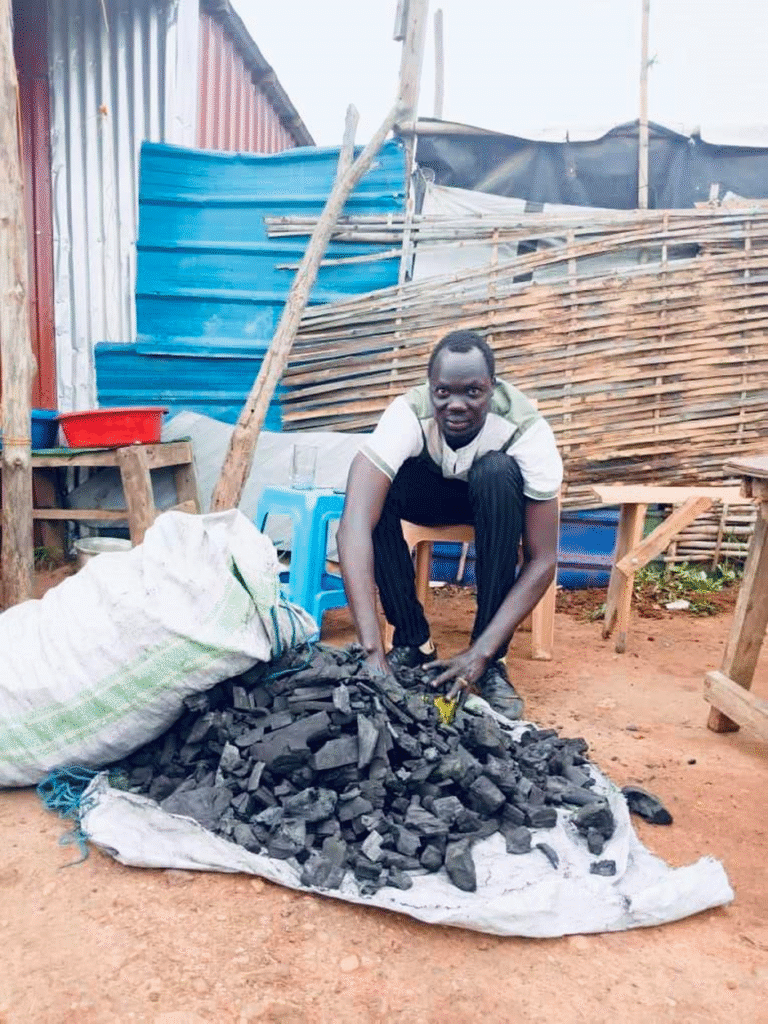South Sudan's English Daily Newspaper
"We Dare where others fear"

By Awan Achiek
Armed with a degree from Mekane Yesus Management and Leadership College in Addis Ababa, Gal Gony Gatluak has achieved financial stability in an unexpected sector, the charcoal trade. Despite its “dirty” image, he views this business as an honest and essential source of income, demonstrating that dignity and success can emerge from even the most challenging circumstances.
While struggling to make ends meet, Gong, a 38-year-old accounting graduate, conceived the idea of producing and selling charcoal at Suk Harnab on the outskirts of Juba.
Gong refused to let the dire situation in his country define him.
Since starting his business on 1st July 2025 with just five bags of charcoal, he has been able to earn money and meet his daily needs.
Through this venture, he supports his two wives and children living in refugee camps in Uganda and Ethiopia.
“I started on 1st July this year. I decided to rent this place we are sitting in, starting with five bags of charcoal, which eventually grew to ten,” he told the Dawn in an interview on Saturday.
His job search concluded when he received advice on how to earn ‘clean money’ from the charcoal trade.
“One reason is the economic hardship in the country. Another is unemployment. I waited for a long time for opportunities, knowing my family relied on me,” he explained.
“I could not idle under trees playing dominoes or simply passing time. I had to work to sustain my family’s living.”
Gong launched his business with financial assistance from his relatives.
“When I found myself without a job, either with the government or any institution, I approached some relatives for help. They provided support, which motivated me to take action.”
With rising charcoal prices, suppliers now charge up to 50,000 SSP for large sacks, while Gony sells smaller packages for 2,000 SSP.
“The price of charcoal has increased significantly. Last month, we sold this small package for 1,500 SSP; now it is 2,000 SSP, and the cost of a bag has risen to 50,000 SSP,” he noted.
Despite his qualifications, Gony faced difficulties in securing employment.
“This business is now greatly benefiting my family, especially during these hard times. Since I embarked on this venture, I have not asked my relatives for assistance to support my family.”

He stated that he is not limited to charcoal; he also plans to sell dried fish.
“I have sent some money to Bor town in Jonglei State to acquire dried fish.”
“My whole family depends on me for everything, including medications, school fees, clothing, and food.”
He argued that, given the current unemployment rate in the country, engaging in the charcoal trade is a lucrative opportunity compared to being jobless.
“You know, there’s no such thing as a bad business. What is needed is a shift in mindset, to move away from the notion that you cannot engage in this type of business due to potential mockery or insults from others.”
“I urge my fellow brothers and sisters, as life is not treating us as we expect, we must take any job available to ensure our sustainability.”
Gong graduated in 2016 from one of Ethiopia’s oldest universities, Mekane Yesus Management and Leadership College in Addis Ababa.
He completed his primary education in 1994 and his secondary education in 2000 while residing in a refugee camp in Dima.
He has worked with both humanitarian and government organisations, most recently serving in 2022 as the executive director in the office of the former governor of Upper Nile State.
Bush Buse, a peace activist and programme coordinator for the Whitaker Peace and Development Initiative, praised the youth for creating opportunities, stating, “Pride does not pay bills.”
“There are many others who are too proud to engage in work such as the charcoal trade or selling fruits while pushing wheelbarrows. But pride does not pay bills,” Buse remarked.
He identified numerous challenges facing young people, including unemployment stemming from various issues such as conflict and lack of proper opportunities.
He urged the government to expedite youth enterprise development funds to alleviate the unemployment rate in the country.
“This youth fund wil be used to develop the cultural sector, as this is the only sector that can absorb a large number of young people,” he stated.
“We need to raise funds for young people, and we want to see more young individuals starting businesses that have a social impact, such as those in agriculture.”




